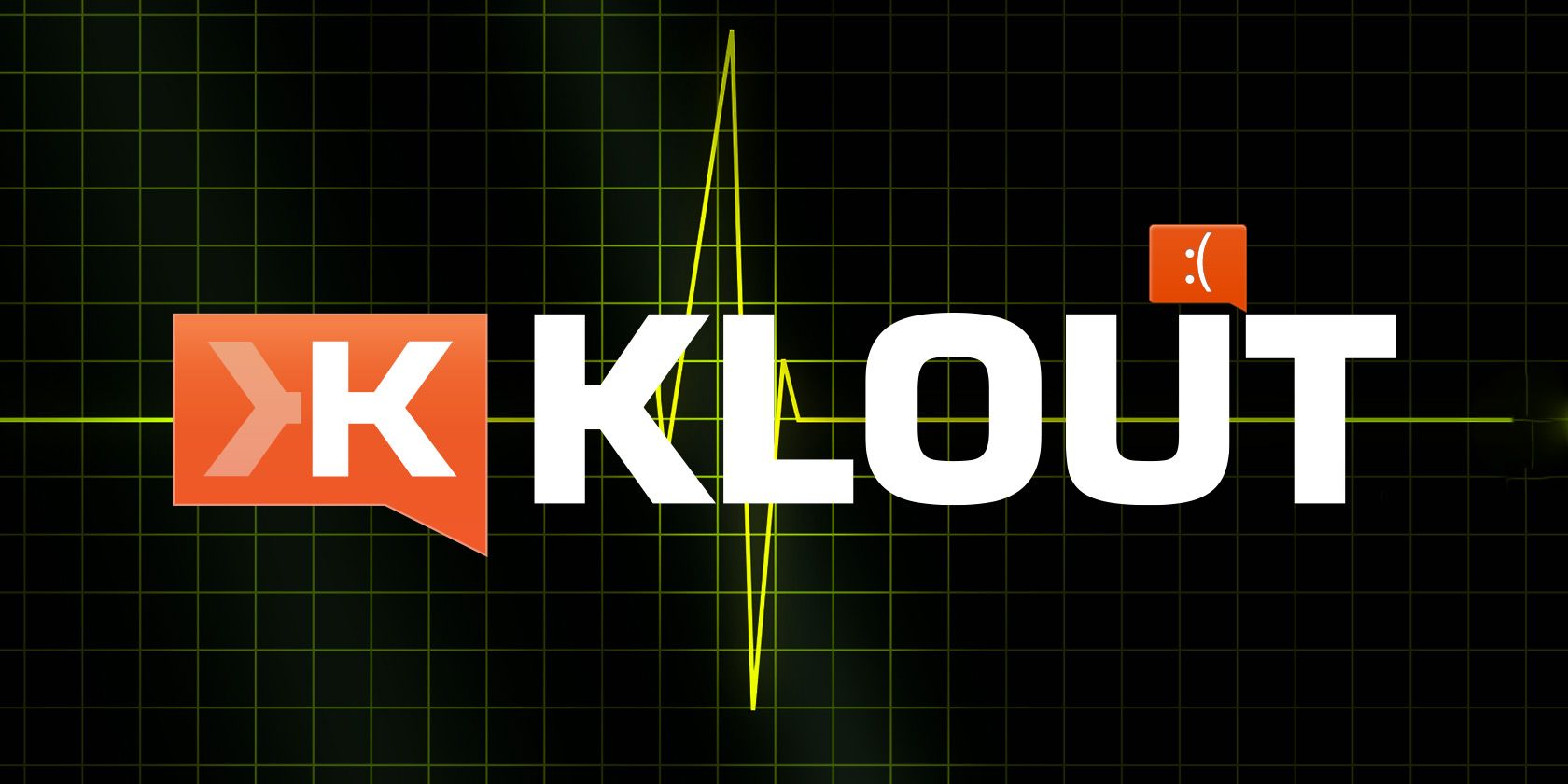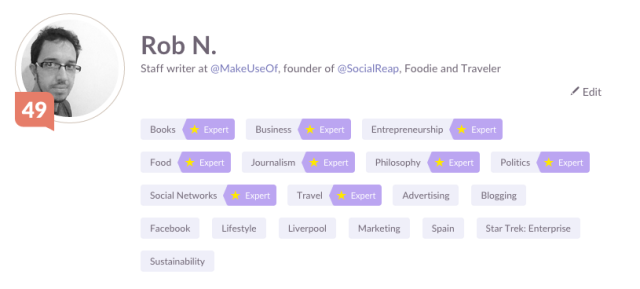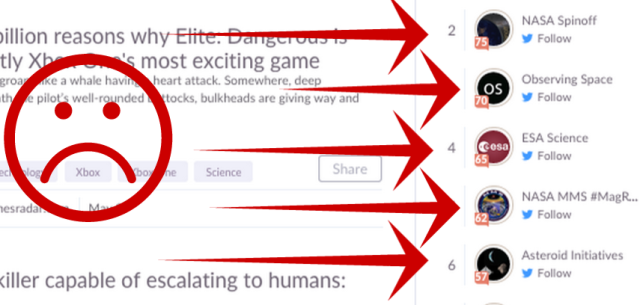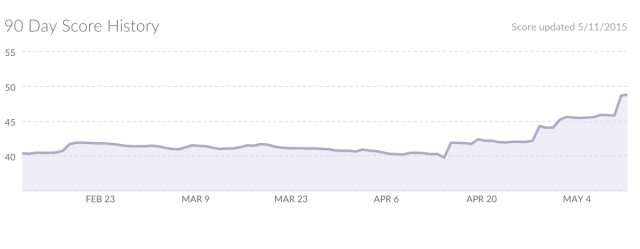Since 2008, Klout has been combing through social media data to give each user a rank (0-100) based on their influence in certain niches. The way Klout does this, however, bears little use in today's social media environment, making Klout's value to the world of social media smaller than ever.
With marketing gurus and authors on business and social influence saying similar things, is Klout something that we should finally be saying goodbye to once and for all?
How Does Klout Work?
The full workings of Klout aren't publicly available, but in short, the platform takes data that's available from the social networks that you connect to it, and ranks your influence in certain topics, on a scale of 1-100. This score is based on things like public interactions, who we follow, who follows us, the hashtags we use, our connections, what we retweet, and the topics we most often engage with.
In other words, it blatantly mistakes our interests, for our expertise. Simply because I repeatedly talk to people on Twitter about books, for instance, in no way makes me an expert on books. Due to Klout's workings though, having a curious interest, and the development of expertise in something, are indistinguishable.
All of your interactions and everything you publish go on to affect your Klout "score", which is what this is all about. As Dave Parrack said in a past post on Klout "to ultimately get the most out of Klout you’ll have to play the social networking game". This is precisely where we have the issue. Klout is little more than vanity. A game, where your score, or anybody else's, reflects very little real value.
Social media guru Gary Vaynerchuk — who's never actually signed up for a Klout account — said in a 2014 video "these kind of scoring systems that try to prove your social equity in the marketplace are not things I'm a big fan of. They're super-gameable". He even went on to say that "a lot of you have hit me up on Twitter because if I replied to you, you knew that your Klout score would go up... and I was thrilled to give it to you, because I knew how little it actually meant... I believe in it so little I didn't even want to acknowledge it by signing up".
Influence is Overrated
Klout wants to help us find influential people in certain niches (as prescribed in the video above). If we log in and search for "Space Technology", we're given a selection of the "most influential" social accounts on space tech. Whether you're using this information to try and land a job, promote a business, idea, find a mentor, or to find someone to network with, Klout's recommendations are supposed to be the best people to snuggle up with.
This whole approach to the world, both personal and professional, is called "influencer marketing", and is something Malcolm Gladwell enthusiastically promotes in his book, The Tipping Point. This is a form of marketing that Klout pushes relentlessly on its blog, but it's largely outdated. Our understanding of how to "work your way up", get your idea seen, and your voice heard, has improved. To quote Jonah Berger in his book Contagious: How to Build Word of Mouth in the Digital Age:
"Malcolm Gladwell argues that social epidemics are driven 'by the efforts of a handful of exceptional people' whom he calls mavens, connectors, [influencers]... Marketers spend millions of dollars trying to find these so-called opinion leaders and get them to endorse their products, [but] by focusing so much on the messenger, we've neglected a much more obvious driver of sharing: the message"
And that's the point. The way Klout works downplays what you say, in favour of who you say it to. This is not the way to build relationships, and is most definitely not the way to build influence. In Berger's book, he rather convincingly explains that influence is much more likely to be achieved by saying something important and meaningful to lots of not-so-influential people, in a way that truly encourages them to share that idea, than to target your ideas to a few influentials at the top. Berger goes on to say:
Describing why a small handful of cool or connected people (so-called influentials) are not as important to social epidemics as we might think, sociologist Duncan Watts makes a nice comparison to forest fires. Some forest fires are bigger than others, but no one would claim that the size of the fire depends on the exceptional nature of the initial spark. Big forest fires aren’t caused by big sparks. Lots of individual trees have to catch fire and carry the flames.
In other words, focus your efforts on the many trees, not the few sparks.
The Results Are Terrible
To continue with the example from earlier, the top 10 results Klout dishes out when you search for "Space Technology" are; Orion Spacecraft, NASA Spinoff, Observing Space, ESA Science, NASA MMS, Asteroid Initiatives, Chris Levicki, Stephen C Smith, SpaceRef China, and Smallsats.
The vast majority of these are not the kinds of accounts you want to be contacting if you're actively trying to build a more valuable network, or your own influence. Sure, contacting Chris Levicki, or Stephen C Smith shows some promise, but the other 80% of suggestions? I wouldn't hold your breath.
Let me put it this way. If you expect to receive a response, which account do you think is most likely to respond to you, and thereby help you out; NASA's hugely "influential" Twitter account (Klout score of 99!), or someone like Director of Astrophysics at NASA, Paul Hertz, who's not even on Klout?
Believe me, the progress you could make from a real conversation with someone like Paul Hertz, or another not-too-socially-influential person, far outweighs the benefit you'd receive if NASA retweeted you. Your Klout score may increase, sure, but anything meaningful in your life? Unaltered.
The reason why Klout even displays corporate accounts in its results at all makes very little sense, but it must be understood that the influence of these social accounts (according to Klout scores) bears no resemblance whatsoever to how they may be able to help you (or you help them).
Quantity Does Not Equal Quality
This point extends on the previous point. As I've said before, "A larger number of fans, followers and likes has pretty much no correlation with higher return on investment [or influence]". On a parallel thread, a high or low Klout score bears no correlation to how much influence that person can have on your your life or career, or how much real influence you can have over anyone else. The video above explains this pretty well. Simply substitute any mention of "likes" or "followers" with "Klout score", and the point still stands.
Let's bring in Gary Vaynerchuk to explain with an example.
“You have six followers...You tweet out that you hate British Airways. One of those six 'completely irrelevant' followers retweets you...and she has 39 followers. Now let’s say one of those 39 people happens to be her friend from college… who happens to be a showrunner on The Today Show. What if that happens? What if that showrunner brings the story to the producers and all of a sudden you’re leading off the next episode of The Today Show?
The thought that low numbers of human beings [or Klout scores] can somehow be irrelevant is ludicrous...all it takes is for one tweet to be noticed by one person.” (It's Not About The Numbers)
What Else?
The principle idea of Klout was to bring some social accountability and a reliable way of seeing someone's role within an industry or topic of interest. That's not a bad idea at all, and if done well would be immensely valuable, The problem is that Klout "got everything backward. Its system created a selection pressure for frivolity at the expense of truth" (Slate). And no matter what additional features and changes Klout has introduced, these problems still remain.
To paraphrase some of the points in that Slate article, by linking up all of our profiles into one scoring system dilutes who we really are. What we say and appear as to our friends on Instagram is likely entirely different to how we portray ourselves on LinkedIn. By compounding all of these disparate personalities, Klout necessarily watered down its picture of us in our universal Klout score.
And if anyone truly believes their Klout score can have an impact on their overall success, this gives, again according to Slate, "every incentive to game the scores. They are goaded into behaving artificially on social networks: sharing safe Like-bait, and holding back anything they deem quirky, eccentric, or controversial."
Let's Focus on Quality
What we should not be doing is rushing into attempting to quantify something as complex as who we are, and where we stand in relation to other people. This is an issue psychologists and sociologists have been battling for decades, so let's not pretend that a group of entrepreneurs are likely to throw something together over a few months or a couple of years that reliably does the job.
While we wait, let's instead focus on the quality. Social media is all about giving. It's about giving in to serendipity, and seeing where real, true conversations take us. Just as in real life, this will likely offer plenty more unique opportunities than chasing a marginal increase in less than influential Klout scores.
Do you use Klout? If so, what value do you gain from it? If not, why not?




